Since the first awards were presented in 1953, the Hugos have helped the science fiction and fantasy community honor some of the greatest authors of the genre. If you’re looking for an exceptional read, look no further. Whether you're looking for a short story or a full-length novel, these Hugo Award winners are sure to feed your appetite for out-of-this-world adventures.
16 Hugo Award Winners You Should Read
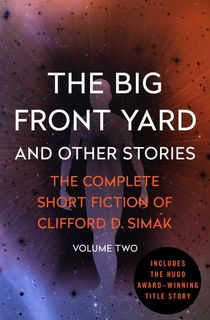
The Big Front Yard
Hugo Award: Best Novelette, 1959
The Competition: Unwillingly to School by Pauline Ashwell, Captivity by Zenna Henderson, Reap the Dark Tide by C. M. Kornbluth, A Deskful of Girls by Friz Leiber, Second Game by Katherine MacLean and Charles V. De Vet, Rat in the Skull by Rog Phillips, The Miracle-Workers by Jack Vance
Other 1958 Hugo Winners: A Case of Conscience by James Blish (Best Novel), "That Hell-Bound Train" by Robert Bloch (Best Short Story)
The Big Front Yard follows mysterious alien beings who turn an ordinary house into an interplanetary portal to connect habitable plants. After unearthing a space ship in the front yard, Hiram Taine discovers the portal that allows him to access another planet by simply walking through the front door—leading to the discovery of many other planets all connected by these portals. This collection also includes other short stories by Simak.
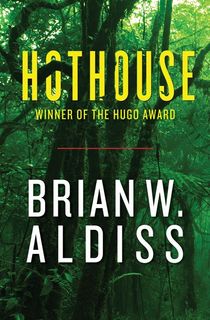
Hothouse
Hugo Award: Best Short Fiction, 1962
The Competition: "Monument" by Lloyd Biggle, Jr., "Scylla's Daughter" by Fritz Leiber, "Status Quo" by Mack Reynolds, "Lion Loose" by James H. Schmitz
Other 1962 Hugo Winners: Stranger in a Strange Land by Robert A. Heinlein (Best Novel)
In a future Earth, the planet has stopped spinning—leaving the planet half dark and half light. Fighting the odds, humans are one of the few animal species that still exist (though, in small numbers), and plants have taken over the sunlit half of this new world. The novel, composed of five novelettes, was originally serialized in The Magazine of Fantasy & Science Fiction and later published in a full volume. Collectively, the stories were awarded the 1962 Hugo Award for Best Short Fiction.
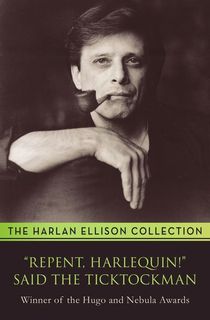
"Repent, Harlequin!" Said the Ticktockman
Hugo Award: Best Short Story, 1966
The Competition: "Marque and Reprisal" by Poul Anderson, "Day of the Great Shout" by Philip José Farmer, "Stardock" by Fritz Leiber, "The Doors of His Face, the Lamps of His Mouth" by Roger Zelazny
Other 1966 Hugo Winners: Dune by Frank Herbert (Best Novel)
Ellison’s short story won the Hugo Award in 1966 and is set in a highly regulated dystopian future. Specifically, everyone must do things according to a precise time schedule. Being late has severe consequences: Time is taken from you and if you run out of time the Master Timekeeper, the “Ticktockman,” takes your life. A man who disguises himself as the Harlequin is at the forefront of the story—and urges people to rebel against the Ticktockman and time itself … before his own runs out.
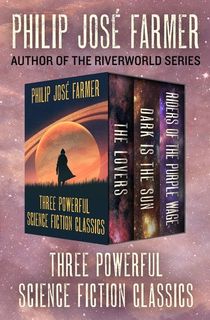
The Lovers * Dark Is the Sun * Riders of the Purple Wage
Hugo Award: Best Novella, 1968
The Competition: Weyr Search by Anne McCaffrey (co-winner), Damnation Alley by Roger Zelazny, The Star Pit by Samuel R. Delany, Hawksbill Station by Robert Silverberg
Other 1968 Hugo Winners: Lord of Light by Roger Zelazny (Best Novel), Gonna Roll the Bones by Fritz Leiber (Best Novelette), "I Have No Mouth, and I Must Scream" by Harlan Ellison (Best Short Story)
Philip José Farmer looks at government supervision and the economy in Riders of the Purple Wage, which shared the Hugo Award for Best Novella in 1968 with Anne McCaffrey's Weyr Search. The world of Riders of the Purple Wage consists of citizens who all receive a basic income, known as the purple wage, from the government. The plot follows the story of Chib, and his relationship with his great-great-grandfather “Grandpa Winnegan” who hides from the government in his home. Long ago, Grandpa ran a successful company whose workers were highly paid and far more content than the average receiver of the “purple wage.” The novel explores the themes of art, sexuality, and the effect money has on our happiness.
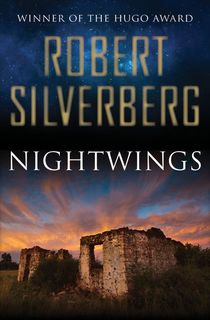
Nightwings
Hugo Award: Best Novella, 1969
The Competition: Dragonrider by Anne McCaffrey, Lines of Power by Samuel R. Delany, Hawk Among the Sparrows by Dean McLaughlin
Other 1969 Hugo Winners: Stand on Zanzibar by John Brunner (Best Novel), The Sharing of Flesh by Poul Anderson (Best Novelette), “The Beast That Shouted Love at the Heart of the World” by Harlan Ellison (Best Short Story)
Winner of the 1969 Hugo Award for Best Novella, Robert Silverberg’s Nightwings takes place in a distant caste-based future, in which some members have been genetically modified to possess specific traits in order to perform particular jobs. The book centers on a member of the Watchers, a guild that has been engineered to use their mental capabilities to watch distant stars and warn the Defenders of alien invasion. But when he visits the old city of Roum (which might have previously been called Rome) he becomes distracted ... potentially causing an alien invasion to commence.
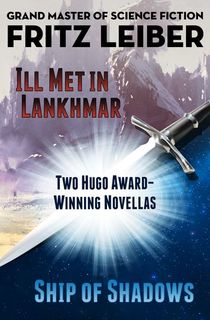
Ill Met in Lankhmar and Ship of Shadows
Hugo Award: Best Novella, 1971
The Competition: “The Thing in the Stone” by Clifford D. Simak, “The Region Between” by Harlan Ellison, “The World Outside” by Robert Silverberg, “Beastchild” by Dean R. Koontz
Other 1971 Hugo Winners: Ringworld by Larry Niven (Best Novel), “Slow Sculpture” by Theodore Sturgeon (Best Short Story)
The 1971 Hugo Award winner for Best Novella, “Ill Met in Lankhmar” recounts the meeting and teaming up of Fafhrd and the Grey Mouser—serving as a prequel of sorts to Leiber’s The Fafhrd and the Gray Mouser book series. Featured alongside four other stories in Swords and Deviltry, “Ill Met in Lankhmar” starts when Gray Mouser and Fafhrd simultaneously ambush the Thieves’ Guild and steal valuable jewels that they themselves had just stolen. Realizing they make a good team, Gray Mouser and Fafhrd join forces and attempt to infiltrate the headquarters of the Thieves’ Guild.
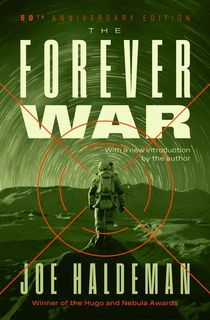
The Forever War
Hugo Award: Best Novel, 1976
The Competition: Doorways in the Sand by Roger Zelazny, Inferno by Larry Niven and Jerry Pournelle, The Computer Connection by Alfred Bester, The Stochastic Man by Robert Silverberg
Other 1976 Hugo Winners: Home Is the Hangman by Roger Zelazny (Best Novella), The Borderland of Sol by Larry Niven (Best Novelette), “Catch That Zeppelin!” by Fritz Leiber (Best Short Story)
The 1974 military science fiction novel, which won the Hugo Award is 1976, is the first book in a three-book trilogy. The Forever War focuses on William Mandella—a physics student who is drafted by the United States Exploratory Force to fight the Taurans, an alien species. After training, the troops are sent to fight in ships traveling thousands of light-years in a split second. But after they slaughter their enemy and return home, time dilation has caused 27 years to pass (though it seemed like 2 years to the troops), and they must learn to adjust to a whole new world—while realizing that the war never truly ends.

Danse Macabre
Hugo Award: Best Related Non-Fiction Book, 1982
The Competition: Doorways in the Sand by Roger Zelazny, Inferno by Larry Niven and Jerry Pournelle, The Computer Connection by Alfred Bester, The Stochastic Man by Robert Silverberg
Other 1982 Hugo Winners: The Art of Leo & Diane Dillon by Leo Dillon, Diane Dillon and Byron Preiss, The Grand Tour by Ron Miller and William K. Hartmann, After Man by Dougal Dixon, Anatomy of Wonder, Second Edition by Neil Barron
The winner of the 1982 Hugo Award for Best Related Non-Fiction Book, Stephen King’s Danse Macabre is about horror fiction in all different mediums—as well as the influence society has had on the genre. Within his book, King includes the influences on his own writing and the important historical texts that started the genre, going as far back as the Victorian era.
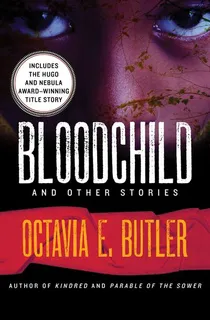
Bloodchild
Hugo Award: Best Novelette, 1985
The Competition: Doorways in the Sand by Roger Zelazny, Inferno by Larry Niven and Jerry Pournelle, The Computer Connection by Alfred Bester, The Stochastic Man by Robert Silverberg
Other 1985 Hugo Winners: Neuromancer by William Gibson (Best Novel), Press Enter [] by John Varley (Best Novella), “The Crystal Spheres” by David Brin (Best Short Story)
Octavia Butler’s short fiction “Bloodchild” won the 1985 Hugo Award for Best Novelette (as well as a Nebula Award and a Locus Award). Just one of the exceptional short stories featured in this collection, “Bloodchild” explores the relationship between a race of aliens called the Tlic and the humans who have escaped Earth and settled on the Tlic planet. The Tlic soon realize that humans are excellent hosts for Tlic eggs and make it mandatory for every human family to choose a child for implantation in exchange for protection. Though Gan thinks it’s an honor to be a host, he soon learns that there’s a darker side to this kind of duty.

Hyperion
Hugo Award: Best Novel, 1990
The Competition: A Fire in the Sun by George Alec Effinger, Prentice Alvin by Orson Scott Card, The Boat of a Million Years by Poul Anderson, Grass by Sheri S. Tepper
Other 1990 Hugo Winners: The Mountains of Mourning by Lois McMaster Bujold (Best Novella), Enter a Soldier. Later: Enter Another by Robert Silverberg (Best Novelette), “Boobs” by Suzy McKee Charnas
The 1990 Hugo Award for Best Novel went to Dan Simmons for Hyperion, the first novel in the four-book Hyperion Cantos series. Inspired loosely by Chaucer's Canterbury Tales, the story follows a disparate group of pilgrims on a long voyage to the Time Tombs on Hyperion. The travelers—many of whom have ulterior motives they hide from their companions—are intent on reaching the Time Tombs before the rapidly-approaching end of the universe. They each hope to find different things among the Time Tombs, but are haunted by the monstrous half-man, half-machine creature called the Shrike. An evocative and wildly inventive adventure, it's easy to see why Simmons' unique novel was honored at the Hugos.

Kirinyaga
Hugo Award: Best Novelette, 1991
The Competition: A Braver Thing by Charles Sheffield, Tower of Babylon by Ted Chiang, The Coon Rolled Down and Ruptured His Larinks, A Squeezed Novel by Mr. Skunk by Dafydd ab Hugh
Other 1991 Hugo Winners: The Vor Game by Lois McMaster Bujold (Best Novel), The Hemingway Hoax by Joe Haldeman (Best Novella), “Bears Discover Fire” by Terry Bisson (Best Short Story)
Mike Resnick’s book Kirinyaga is composed of ten shorts that were designed to fit together in a novel. One of these, “The Manamouki,” won the 1991 Hugo Award for Best Novelette. The stories in Kirinyaga follow one man’s attempt to preserve African culture in a future “utopia.” The prologue discusses whether or not a Kenyan tribe can still stay true to its roots while adopting European customs.

American Gods
Hugo Award: Best Novel, 2002
The Competition: The Curse of Chalion by Lois McMaster Bujold, Passage by Connie Willis, Perdido Street Station by China Miéville, The Chronoliths by Robert Charles Wilson, Cosmonaut Keep by Ken MacLeod
Other 2002 Hugo Winners: Fast Times at Fairmont High by Vernor Vinge (Best Novella), Hell Is the Absence of God by Ted Chiang (Best Novelette), “The Dog Said Bow-Wow” by Michael Swanwick
Neil Gaiman's now-iconic supernatural novel won both a Nebula and Hugo Award for Best Novel in 2002. The epic standalone story follows a war between the Old Gods and the New Gods, waged on the battlefield of modern America. Shadow Moon, a convict released from jail to attend the funeral of his wife and best friend, agrees to work for a mysterious man named Mr. Wednesday, who is eventually revealed to be the Old God Odin. The existence of the Old Gods depends on mortals' continued belief in them, which is threatened by the popularity of New Gods such as Media. Shadow is caught up in the dangerous conflict as he struggles with his new understanding of the world around him, and cruel revelations about his own past. American Gods has since been adapted into a Starz TV series starring Ricky Whittle as Shadow Moon.

The Yiddish Policemen’s Union
Hugo Award: Best Novel, 2008
The Competition: The Curse of Chalion by Lois McMaster Bujold, Passage by Connie Willis, Perdido Street Station by China Miéville, The Chronoliths by Robert Charles Wilson, Cosmonaut Keep by Ken MacLeod
Other 2008 Hugo Winners: All Seated on the Ground by Connie Willis (Best Novella), The Merchant and the Alchemist’s Gate by Ted Chiang (Best Novelette), “Tideline” by Elizabeth Bear
Chabon’s alternate history book takes place in a world in which Alaska became a temporary sanctuary for Jews during World War II, thus saving four million Jews from being murdered during the Holocaust. In Sitka, Alaska, Meyer Landsman—an alcoholic homicide detective—is investigating the murder of Mendel Shpilman, who many Jews believe to be the next messiah. But as Landsman and his partner Berko Shemets continue their investigation, they’re brought deeper and deeper into a shocking plot.

Blackout/All Clear
Hugo Award: Best Novel, 2011
The Competition: Feed by Mira Grant, Cryoburn by Lois McMaster Bujold, The Hundred Thousand Kingdoms by N.K. Jemisin (Orbit) The Dervish House by Ian McDonald
Other 2011 Hugo Winners: The Lifecycle of Software Objects by Ted Chiang (Best Novella), The Emperor of Mars by Allen M. Steele (Best Novelette), “For Want of a Nail”, Mary Robinette Kowal
Originally, Blackout and All Clear were released as two separate novels, but combined, the book won the 2011 Hugo Award for Best Novel. The novels are set in 2060, in a time in which historians at Oxford have the ability to travel back in time to observe historical events. Several time travelers go back to 1940s England to observe the events of World War II, including the evacuation of children and the Blitz. However, time travel comes with its dangers, and the book follows the historians as they attempt to make it safely back home.

The Three-Body Problem
Hugo Award: Best Novel, 2015
The Competition: The Goblin Emperor by Katherine Addison, Ancillary Sword by Ann Leckie, No Award Skin Game by Jim Butcher, The Dark Between the Stars by Kevin J. Anderson
Other 2015 Hugo Winners: The Day the World Turned Upside Down by Thomas Olde Heuvelt and translated by Lia Belt (Best Novelette)
The first entry in Cixin Liu’s phenomenal “Remembrance of Earth’s Past Trilogy” netted the writer a Hugo Award in 2015. The novel takes place during China’s Cultural Revolution when Mao Zedong began to fully enforce communism as the country’s main economic and political system. However, when a secret military unit sends out a signal into space that is intercepted by aliens, the entire planet becomes a target for this species. However, since the country is at odds with each other, various groups that have their own ideologies begin to spring up. Some people want to help the aliens take over since they believe society is inherently corrupt, while others want to preserve life on the planet. As the day of invasion approaches, the entire world is forced to confront many of its ills in this powerful novel.

The Fifth Season
Hugo Award: Best Novel, 2016
The Competition: Uprooted by Naomi Novik, Ancillary Mercy by Ann Leckie, Seveneves: A Novel by Neal Stephenson, The Cinder Spires: The Aeronaut’s Windlass by Jim Butcher
Other 2016 Hugo Winners: Binti by Nnedi Okorafor (Best Novella), Folding Beijing by Hao Jingfang and translated by Ken Liu (Best Novelette), “Cat Pictures Please” by Naomi Kritzer
The 2016 Hugo Award winner for Best Novel was the first book in the Broken Earth series by N.K. Jemisin. The Fifth Season introduces us to a single supercontinent called the Stillness. Every few centuries, catastrophic climate change is endured during what residents of the Stillness call a “Fifth Season.” The book details the end of the world, as the characters must fight to survive it. The subsequent novels in the Broken Earth series, The Obelisk Gate and The Stone Sky, went on to win Jemisin a record-breaking three consecutive Best Novel Hugos in a row. The Fifth Season is currently being adapted for television.
This post is sponsored by Open Road Media. Thank you for supporting our partners, who make it possible for The Portalist to celebrate the sci-fi and fantasy stories you love.








